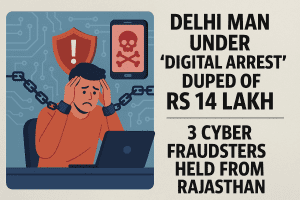New Delhi – Delhi Police successfully apprehended three cyber fraudsters who orchestrated an elaborate digital arrest scheme, extorting ₹14 lakh from a victim through blackmail and impersonation of Crime Branch officials. The digital arrest case highlights the growing sophistication of cybercriminals and their methods of exploiting innocent individuals through psychological manipulation and fear tactics.
The three accused individuals – Vasim aged 30, Javed aged 48, and Khalid – were arrested from their residences in Rajasthan’s Mewar region following an intensive investigation by Delhi Police. This digital arrest case represents a significant breakthrough in combating organized cybercrime networks operating across state boundaries.
Elaborate Digital Arrest Scheme Unfolds

The digital arrest fraud came to light when the complainant approached Delhi Police, reporting that he had been duped by sophisticated fraudsters who recorded compromising videos during a WhatsApp call. The victim’s ordeal began innocuously but quickly escalated into a complex digital arrest extortion scheme designed to extract maximum financial benefit from his vulnerable position.
According to Deputy Commissioner of Police Vichitra Veer from the West district, the digital arrest operation involved multiple stages of psychological manipulation. “During the call, an obscene video of a girl started playing, and she manipulated the complainant into getting nude, subsequently recording his video,” DCP Veer explained, detailing how the digital arrest scheme began with entrapment.
The fraudsters then leveraged the compromising material they had obtained, with the complainant later receiving three obscene videos of himself that had been recorded during the digital arrest setup. This material became the foundation for the extensive blackmail operation that followed.
Also Read: Delhi Road Projects To Transform Capital with Rs. 24,000 Crore Aid By Centre
Crime Branch Impersonation and Escalating Demands
The digital arrest scheme escalated when a man claiming to represent the Crime Branch contacted the victim through WhatsApp, informing him that the girl he had interacted with was allegedly a minor and that his phone had been tracked by police authorities. This false claim formed the cornerstone of the digital arrest psychological manipulation strategy.
To resolve the fabricated ‘crime,’ the caller implementing the digital arrest fraud initially demanded ₹1.5 lakh from the terrified victim. However, the extortion didn’t end there, as the fraudsters called twice more to demand additional payments of ₹2.5 lakh and ₹4 lakh respectively, demonstrating the systematic nature of this digital arrest operation.


The digital arrest scheme reached its climax when the fraudster called again with even more alarming false claims. “The complainant stated that the fraudster called again and threatened that the girl had committed suicide and that the complainant would be arrested. He further demanded ₹6 lakh for ‘settling’ the case, which the complainant also transferred,” DCP Vichitra Veer detailed, showing how the digital arrest psychological pressure intensified.
Investigation and Breakthrough in Digital Arrest Case
After losing ₹14 lakh to the elaborate digital arrest scheme, the complainant finally approached the cyber police station to report the fraud. This decision proved crucial in unraveling the entire digital arrest network and bringing the perpetrators to justice.
Investigators methodically traced the bank accounts to which the digital arrest extortion money had been transferred, leading them to Mewat, which is recognized as a notorious cybercrime hub in the region. The digital arrest investigation revealed the sophisticated money laundering network used by the criminals to obscure their tracks.

Following the financial trail of the digital arrest fraud, police conducted coordinated raids at the houses of Vasim and Javed in the Deeg district of Rajasthan, successfully apprehending both suspects. During intensive interrogation, Vasim revealed crucial information about the digital arrest operation, disclosing that Khalid had been responsible for recording the nude videos and impersonating Crime Branch officers.
Complete Digital Arrest Network Dismantled
Based on Vasim’s confession regarding the digital arrest scheme, police conducted another raid at Khalid’s residence, successfully apprehending the third member of the criminal network. “A raid was conducted at Khalid’s residence, and he was apprehended too,” DCP Veer confirmed, marking the complete dismantling of this particular digital arrest operation.
All three men were formally arrested on Wednesday following extensive questioning about their roles in the digital arrest fraud. The coordinated arrests represent a significant victory for law enforcement in combating increasingly sophisticated cybercrime networks.
Unique Aspects of This Digital Arrest Investigation
A police officer noted important distinctions between this digital arrest case and typical cybercrime investigations. Usually, users of mule accounts remain unaware of the main suspects in digital arrests schemes, as they are typically tasked only with siphoning money from accounts and transferring it elsewhere without knowledge of the broader operation.
“However, in this case, the suspects knew each other as they were all working together. This facilitated to nab the main accused swiftly,” the officer explained, highlighting how the interconnected nature of this digital arrest network actually aided in the investigation and arrests.
Digital Arrest Fraud Methods and Prevention
The digital arrests case demonstrates several common tactics used by cybercriminals to exploit victims. The scheme typically begins with seemingly innocent online interactions that quickly turn into compromising situations. Once criminals obtain incriminating material, they leverage it through impersonation of law enforcement officials to create fear and urgency.
The psychological manipulation employed in digital arrests cases relies heavily on victims’ fear of legal consequences and social embarrassment. Criminals exploit these emotions to bypass rational thinking and pressure victims into making hasty financial decisions.
Law Enforcement Response and Future Prevention


This successful digital arrests investigation showcases the effectiveness of coordinated law enforcement efforts across state boundaries. The Delhi Police’s systematic approach to tracing financial transactions and conducting targeted raids demonstrates evolving investigative techniques for combating cybercrime.
The resolution of this digital arrest case serves as both a warning to potential criminals and reassurance to citizens that law enforcement agencies are actively working to combat sophisticated cyber fraud schemes. Citizens are encouraged to report suspected digital arrests attempts immediately rather than succumbing to extortion demands.


